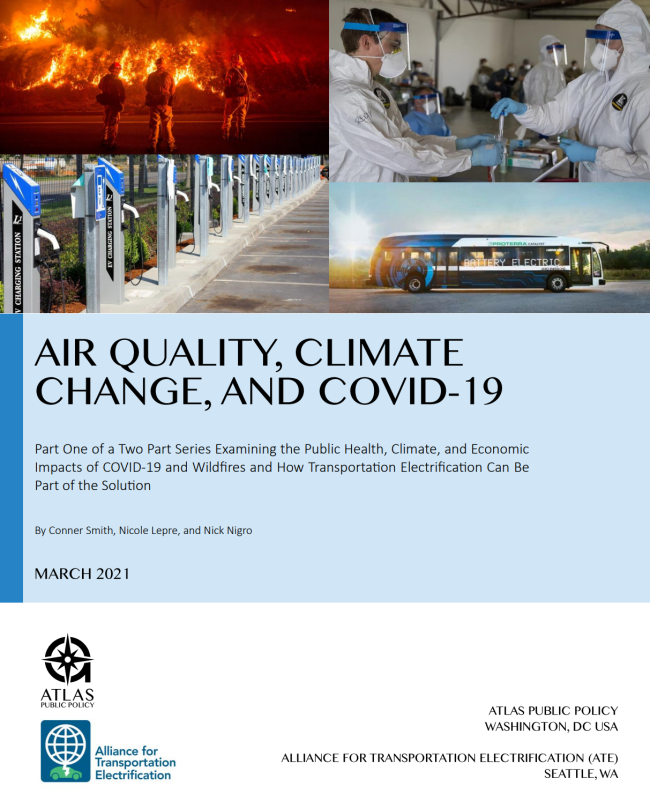WASHINGTON (March 25, 2021) – Atlas Public Policy (Atlas) in partnership with the Alliance for Transportation Electrification published today a research paper, “Air Quality, Climate Change, and COVID-19,” which explores the connections between the pandemic, public health, and emissions, and the role of transportation electrification as a part of the solution. The paper encompasses a broad range of research and analysis important both to society and economy, including the public health impacts of the pandemic and climate crisis, as well as the severe economic consequences, especially the loss of jobs and reduced number of people seeking permanent employment. The paper also explores the role of increasing transportation electrification in achieving long lasting health and climate benefits through reductions in both greenhouse gases and criteria air pollutants as well as economic benefits through job creation and investment in domestic supply chains.
“Now is the time for the United States to accelerate our investments in electric transportation and reemerge from the pandemic as a global leader in this imperative industry,” says Nick Nigro, Founder of Atlas Public Policy.
While some of the challenges of the last year will recede as the country recovers from the pandemic, others are likely to continue to unfold in the years to come. Communities of color who continue to suffer disproportionate health and employment outcomes from COVID-19 also bear the heaviest burden of emissions from vehicles, ports, power plants, refineries, and other major sources of air pollution. Studies have shown that a one unit increase in fine particulate pollution exposure can increase COVID-19 mortality risk by up to eight percent.
These challenges are exacerbated in communities in from New Mexico to Washington state, where record wildfires swept through large swaths of the region and produced unhealthy air quality for several months. Wildfires and other extreme weather events are becoming more frequent and intense due to the warming atmosphere caused by increased greenhouse gases (GHGs) and other factors.
The immense cost of $3.6 billion tag associated with crisis response in 2020 alone has placed additional strain on states seeking to provide services for their citizens as they struggle to contain the spread of the coronavirus, not to mention the inevitable impacts on insurance costs for families and communities.
Stakeholders in the energy and transportation sectors are rising to these challenges and investing in transportation electrification to deliver economic, public health, and environmental benefits throughout the county.
Both the pandemic and the severe wildfire season have brought increased attention to connections among air quality, climate change, public health, and economic and environmental justice. Reducing emissions from all sectors will be essential to address these challenges and transportation electrification serves as both a necessary intervention and unique opportunity with wide-ranging benefits.
“This paper should open new avenues for discussion within the energy and transportation sectors and stakeholders. The issues of social justice, climate, energy, public health, wildfires along with jobs and economy are significant issues in which zero emission vehicles and clean transportation systems will undoubtedly play a key role,” says Phil Jones, Executive Director of the Alliance for Transportation Electrification.
This paper is the first paper in a two-part series. The second paper in the series will provide a closer look at the specific ways transportation electrification can address these challenges and includes an assessment of near-term policy and funding opportunities to decarbonize the transportation system.
You can access the report here.
Contact Nick Nigro (nick.nigro@atlaspolicy.com) of Atlas Public Policy at (202) 750-4314 or Phil Jones (phil@evtransportationalliance.org) of the Alliance for Transportation Electrification for more information regarding this report.
About Atlas Public Policy
Visit our newsroom for more press releases and Atlas in the news.
